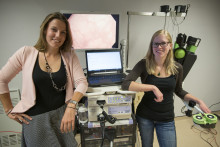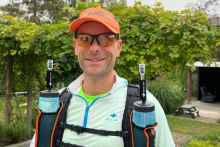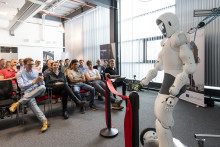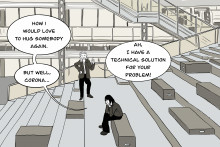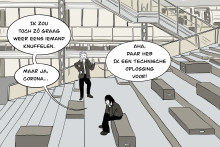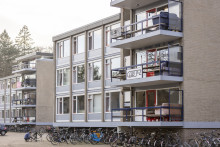The magazine Vrij Nederland named 101 top nerds of the country based on the nominees' technological inventions or solutions related to actual problems. Esther Rozeboom and Nanda van der Stap, PhD candidates from the Robotics and Mechatronics group, both made the list for their research within the project Teleflex - Robotics for flexible endoscopic surgery.
Can you please describe the focus of your research?
Rozeboom: ‘The Teleflex project aims to develop a robotic system to control a flexible endoscope, which is able to perform minimal invasive surgeries. We, of course, each have our individual research, but we collaborate closely within this project.
The first prototype of the robot has been designed and it’s already functioning. It needs to be tested in clinical practice and I´m responsible for evaluating the clinical and user feedback.’
Van der Stap: ‘For my research, I investigate different applications of the robot and I develop vision based algorithms to improve them. I work on new functionalities, such as image based navigation or systems for camera stabilization.’
Has the robot already been used on patients?
Rozeboom: ‘Yes, we have already done a patient study and it was very successful. So far, we only use the robot for diagnostic procedures, though, and we perform surgery simulations. All participating doctors love working with the robot, which gives us a lot of feedback.’
Why do you think you were nominated for Nerd 101?
Van der Stap: ‘To be on the list, you need to fulfill certain criteria - your work needs to represent a relatively recent innovation with societal impact, it needs to be creative and original and / or have commercial potential. I think this research fits all these criteria.
The prototype has been developed within 1 year and we didn’t need to make any mechanical changes to it so far. I’m glad we were nominated, because now we can be easily found within the entire Dutch scientific community.’
Do you consider yourselves ´nerds´?
Van der Stap: ‘I’d say so. When I told my friends I was officially among the top 101 nerds of the Netherlands, they said: But we already knew that!’
Rozeboom: ‘In comparison with other people here at the university, we might not be nerds, but when working in a hospital, I definitely feel as a nerd.’
Van der Stap: ‘I think that nerds are trendy nowadays. People are discovering how handy computers and robots actually are.’
Why did you decide to work in robotics?
Rozeboom: ‘I’m very interested in how human body works, but I never wanted to become a medical doctor. This line of work is constantly intellectually challenging and it allows you to build wide networks. Robotics are fascinating - figuring out how to make the robots do what you want them to.’
Van der Stap: ‘Indeed, a lot of robotics could be improved by observing the human body. How the whole body system works is amazing, but I never wanted to be a surgeon. I think robotics is very creative, it keeps you on your toes.’


